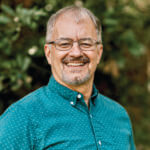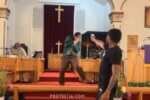Sometime around 1966 my Baptist grandmother tried to set me straight about racial issues. I was just a clueless kid, oblivious to the impact the civil rights movement was having on the world around me. Old mind-sets were being uprooted in Georgia and Alabama, where all my relatives lived. My grandmother was probably worried that I might grow up to be one of those long-haired hippies who marched with their black friends to protest segregation.
I’ll never forget her stern lecture. “Lee,” she drawled, “the black people have their church, and the white people have their church. And that’s the way the Lord wants it.”
Somehow my 8-year-old brain refused to absorb her message. Even at that age I knew something wasn’t right about segregation. So by the time I became a teenager, I rebelled against Southern white attitudes and embraced African-American culture.
In fact, I wanted to be black. I used AfroSheen on my curly hair, watched Soul Train on Saturday afternoons and listened to 1970s rhythm and blues on the radio—especially the Staple Singers, Stevie Wonder and the Four Tops. I even made my father take me to a Gladys Knight and the Pips concert in downtown Atlanta. I think we were the only white people in an audience of 10,000 at the Omni arena.
I was searching for togetherness in a divided world. Yet during that time I never ventured into a black church. On Sunday mornings I was still in my regular pew in an all-white congregation where we sang traditional hymns and ignored the turmoil that had erupted in Memphis, Montgomery and Birmingham.
But everything changed when I was baptized in the Holy Spirit a few years later. Suddenly I found myself worshiping with black Pentecostals—and their exuberance stirred something deep inside me. As I spent more time with them I discovered a missing dimension of my faith. Up until then I had experienced only the white version.
Over the next several years I came to appreciate the infectious passion of the black church—where people stand and shout during sermons, clap off beat instead of on beat, dance during worship and carry their zeal into the streets to fight injustice and poverty. I learned that there is a difference between going to church (which I had done my whole life, in air-conditioned comfort and always for one hour at a time) and “having church”—the African-American way of describing a four-hour-long marathon revival service that can leave you hoarse and drenched in sweat.
I’ll never forget the first time I decided to join some saints at the altar at a Church of God in Christ congregation in Orlando. People were lingering near the stage after the sermon, waiting for the Holy Ghost to fall on somebody. The choir, swaying to the rhythms of a bass guitar and a Hammond-B organ, belted out a gospel anthem that seemed to go on forever.
I couldn’t contain the joy that kept building in that electric atmosphere. I started moving my feet. Before too long I was tearing up the rug while the drummer provided his ecstatic accompaniment.
I didn’t know that black Pentecostals have a special theology and terminology for this experience. They call it “dancing in the Spirit” or sometimes just “getting the Holy Ghost.” It must have been a strange sight to see the only white man in the place cavorting wildly to the beat while six or seven elderly “church mothers” wearing hats and white gloves circled around me, clapping and praying, “Help him, Jesus!” and “Bless him, Lord!”
When I collapsed in a cushioned pew a few minutes later, I thought to myself: If only my Baptist grandmother could see me now.
You know it’s the work of God when a white guy is plucked from the suburbs and finds a new level of anointing among his black brethren. That’s what the power of Pentecost will do. The Holy Spirit likes to mix things up. He’s not into barriers, so why should we tolerate spiritual segregation?
Let’s have some church, y’all. The beat is on. It’s time to dance on our divisions.
J. Lee Grady is the editor of Charisma. Check out his weekly online columns at fireinmybones.com.
J. Lee Grady is an author, award-winning journalist and ordained minister. He served as a news writer and magazine editor for many years before launching into full-time ministry.
Lee is the author of six books, including 10 Lies the Church Tells Women, 10 Lies Men Believe and Fearless Daughters of the Bible. His years at Charisma magazine also gave him a unique perspective of the Spirit-filled church and led him to write The Holy Spirit Is Not for Sale and Set My Heart on Fire, which is a Bible study on the work of the Holy Spirit.









Leave a Comment
You must be logged in to post a comment.